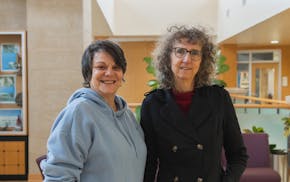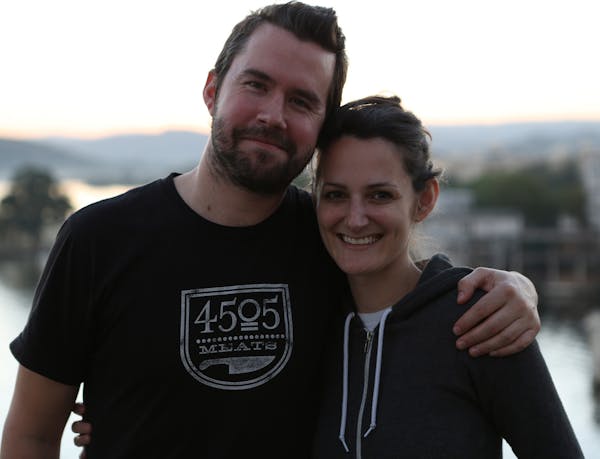Sometimes you don't need a master plan. You simply need to follow a dream.
That's been the case for Daniel Klein and Mirra Fine, the local creators behind "The Perennial Plate" online video series.
Theirs is a tale not only about what we eat and where our food comes from, but also of serendipity.
In 2009, Klein started a weekly online series about eating sustainably in Minnesota. It was an ambitious project — 52 videos for the first year — and done a bit on a whim (more on that in a moment).
But the little project that could morphed into something bigger and better.
After a year filming in Minnesota — and on-the-job training in making videos — Klein and Fine were faced with "What next?"
They settled on a series of food videos from across the country, a project supported in part by sponsors they acquired after their plans were announced on Huffington Post. Toyota came on board with the loan of a Prius, at the encouragement of a film producer who had read about their effort; funds for day-to-day costs, such as gas, came from other sponsors and a Kickstarter campaign.
Six months later — 7 terabytes of footage, 42 states, 50 short films and 23,000 miles — after telling stories about regular folks raising organic vegetables in South Carolina, fishing for mullet in Florida, milking cows in Ohio and more, "The Perennial Plate" duo were headed to Los Angeles to return the car when their cellphone rang.
"We got this call from a random number," said Klein. "It was a PR person asking if we wanted to go to Vietnam." The company — Intrepid, of Australia, which had seen their work online — offered them a two-week trip in exchange for doing a video montage on the food experience in Vietnam. After more than half a million viewers had watched the video, Klein and Fine asked Intrepid to send the team to six countries the following year.
"How about 12 countries?" was Intrepid's response.
"It was a dream question," said Klein.
They're two-thirds through their trip around the world right now (though halfway through the videos they expect to produce), back home in south Minneapolis editing the most recent travels. Soon they'll be off to Copenhagen to speak and screen films for the international food festival put on by René Redzepi of Noma restaurant, followed by more travel for Intrepid in Argentina and Mexico and, later, in South Africa and Ethiopia.
As for their international project being bigger and better? They won a James Beard Award in May for their "World Food Tour" series and grand prize in the Saveur magazine video festival for "A Day in India" (find the videos at www.theperennialplate.com).
And then there was a special moment in the Parmesan cave in Italy when Klein proposed marriage to Fine.
Yes, it's been a heady year for the two.
"It was the best year ever," said Klein.
Minnesotans from the start
Born in St. Paul, Klein and his family moved to Singapore when he was 4, where he grew up with flavors unfamiliar to many Minnesotans, snacks such as peanuts with anchovies and chiles, or a meal of fried baby octopus. From Singapore and its exotic flavors, his family moved to England, where his mother — "a very good cook" — had a bed-and-breakfast inn. At New York University, Klein studied social movements in Latin America and in New York City (an independent major allowed him this leeway, he noted). By his own account, he became a super-activist in college, and food was a significant interest.
After making a documentary film in Africa, Klein returned to New York City, where he became a waiter at Thomas Keller's Bouchon. Three months in the front of the house led to a position in the kitchen where he learned from the master chef himself. "That perfection and dedication of Keller; I was getting a shot at a Thomas Keller kitchen. That's where I learned how to do it right and well." Michael Ruhlman's book "The Soul of a Chef" also influenced him.
There was a stint cooking in Spain and elsewhere before he came back to Minnesota in hopes of opening a restaurant. "I looked at spaces, ate at restaurants and realized that Minnesota didn't need the kind of restaurant I wanted to open," said Klein. And he came to an important realization: "I didn't want to stand over a stove for the next 10 years and be in debt."
But he did want to pull together his interests in gardening and cooking. Klein focused on making a film on eating sustainably someplace outside California. Someplace where you weren't able to reach out and grab a fresh vegetable year-round.
He settled on doing a video of eating locally in Minnesota in the winter, and started with a Thanksgiving video where he killed his own turkey (an episode that turned Fine into a vegetarian). Klein put the video online, figuring it would take too long to find traction elsewhere.
But the Internet needs constant attention — new content to keep viewers interested and coming back — so he planned to do a video every week for a year.
"I remember when Daniel first told me about his idea to start 'The Perennial Plate.' He told me about it on Monday and started to film on Tuesday. He literally just jumped right in without figuring everything out first," said Fine.
In the meantime, Klein was working on a limited basis at France 44 cheese shop, where he was making charcuterie. That's where he had met Fine, who was selling cheese. She had grown up in Linden Hills, went to Southwest High School and the University of Minnesota before going to New York City with hopes of becoming a dancer, only to switch to marketing and graphic design. She had returned to Minneapolis looking for something meaningful to do.
By Episode 8 in Klein's first year of videos, he had asked Fine to be the filmmaker — even though she'd never picked up a video camera before. "Mirra is good at putting people at ease," said Klein.
The series changed her approach to food. A former junk food addict who grew up keeping kosher, she noted, "Working on the films has been a constant reinforcement to be concerned about what I eat and to be challenged by what I do for a living," she said.
For their international year, they spend a month on the road at a time, two weeks in two countries, before coming home to edit their work. "Stories are the priority," said Klein, who uses social media to find people with food tales to tell about how food is produced or prepared.
As for what happens once their travels end in December? No worries. They have thousands of miles still to roam. PBS will feature their work in October. And then?
That's in the hands of serendipity.
A Day in India from The Perennial Plate on Vimeo.
For Udon and Country from The Perennial Plate on Vimeo.

